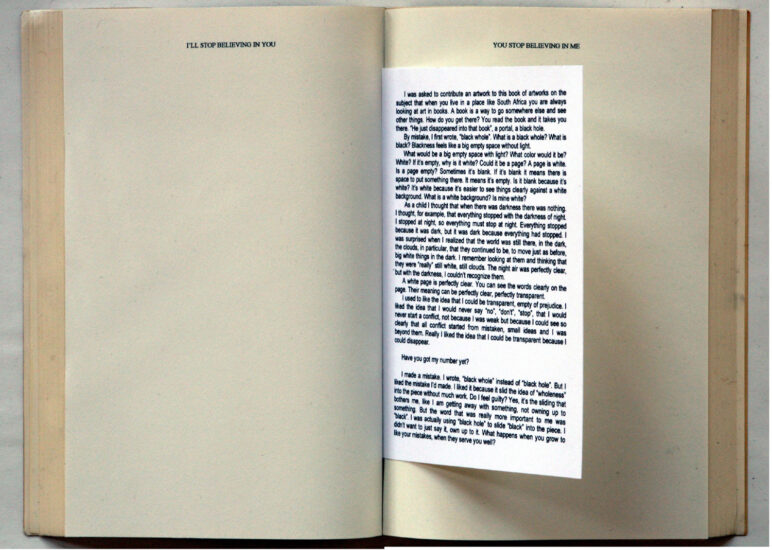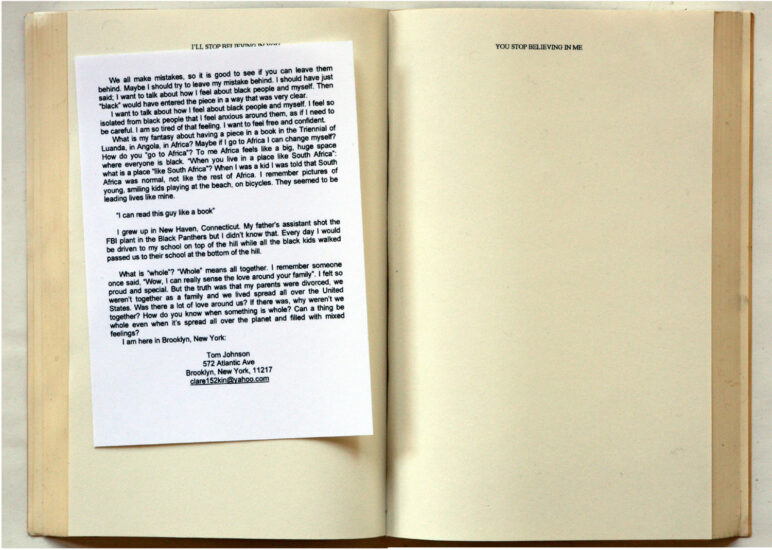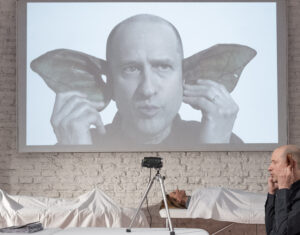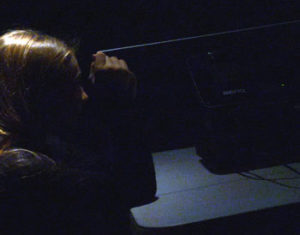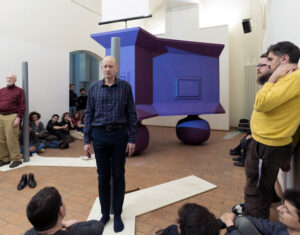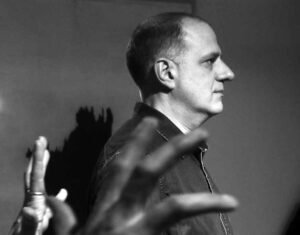Stop believing in me, 2006
Stop believing in me is essay requested for the 2005 Luanda Triennial in Angola as a contribution to the book “I’ll stop believing in you if you stop believing in me” by South African artist Ruth Sacks. The pages were to appear just as they are here, like a double-page spread of yet another double-page spread with these these small cards inserted. The book was conceived in response to Sacks’ perception that the majority of the art she saw she saw in photographic reproduction. To avoid this she conceived of making a book in which each entry was itself the work of art, hence no further act of reproduction would be necessary. My essay took the theme in the direction of investigating racial perception. It was not included in Sacks final project.
The essay is included below. The two accompanying images show it as it would have appeared in the originally intended publication.
Tom Johnson, 2009
Stop Believing in Me
I was asked to contribute an artwork to this book of artworks on the subject of; when you live in a place like South Africa you are always just looking at art in books. A book is a way to go somewhere else and see other things. How do you get there? You read the book and it takes you there. “He just disappeared into that book”, a portal, a black hole.
By mistake, I first wrote, “black whole”. What is a black whole? What is black? Blackness feels like a big empty space without light.
What would be a big empty space with light? What color would it be? White? If it’s empty, why is it white? Could it be a page? A page is white. Is a page empty? Sometimes it’s blank. If it’s blank it means there is space to put something there, empty. Is it blank because it’s white? It’s white because it’s easier to see things clearly against a white background. What is a white background? Is mine white?
As a child I thought that when there was darkness there was nothing. I thought, for example, that everything stopped with the darkness of night. I stopped at night, so everything must stop at night. Everything stopped because it was dark, but it was dark because everything had stopped. I was surprised when I realized that the world was still there, in the dark, the clouds, in particular, that they continued to be, to move just as before, big white things in the dark. I remember looking at them and thinking that they were “really” still white, still clouds. The night air was perfectly clear, but with the darkness, I couldn’t recognize them.
A white page is perfectly clear. You can see the words clearly on the page. Their meaning can be perfectly clear, transparent.
I used to like the idea that I could be transparent, empty, of prejudice. I liked the idea that I would never say “no”, “don’t”, “stop”, that I would never start a conflict, not because I was weak but because I could see so clearly that all conflict started from mistaken, small ideas and I was beyond them. Really I liked the idea that I could be transparent because I could disappear.
Have you got my number yet?
I made a mistake. I wrote, “black whole” instead of “black hole”. But I liked the mistake I’d made. (What happens when you grow to like your mistakes, when they serve you well?) I liked it because it slid the idea of “wholeness” into the piece without much work. Do I feel guilty? Yes, it’s the sliding that bothers me, like I am getting away with something, not owning up to something. But the word that was really more important to me was “black”. I was actually using “black hole” to slide “black” into the piece. I didn’t want to just say it, own up to it. What happens when you grow to like your mistakes, when they serve you well?
We all make mistakes, so it is good to see if you can leave them behind. Maybe I should try to leave my mistake behind. I should have just said; I want to talk about how I feel about black people and myself. Then “black” would have entered the piece in a way that was very clear.
I want to talk about how I feel about black people and myself. I feel so isolated from black people that I feel anxious around them, as if I need to be careful. I am so tired of that feeling. I want to feel free and confident.
What is my fantasy about having a piece in a book in the Triennial of Luanda, in Angola, in Africa? Maybe if I go to Africa I can change myself? How do you “go to Africa”? To me Africa feels like a big, huge space where everyone is black. “When you live in a place like South Africa”: what is a place is “like South Africa”? When I was a kid I was told that South Africa was normal, not like the rest of Africa. I remember pictures of young, smiling kids playing at the beach, on bicycles. They seemed to be leading lives like mine.
“I can read this guy like a book”
I grew up in New Haven, Connecticut. My father’s assistant shot the FBI plant in the Black Panthers but I didn’t know that. Every day I would be driven to my school on top of the hill while all the black kids walked passed us to their school at the bottom of the hill.
What is “whole”? “Whole” means all together.
I remember someone once said, “Wow, I can really sense the love around your family”. I felt so proud and special. But the truth was that my parents were divorced, we weren’t together as a family and we lived spread all over the United States. Was there a lot of love around us? If there was, why weren’t we all together? How do you know when something is whole? Can a thing be whole even when it’s spread all over the planet and filled with mixed feelings?
I am here in Brooklyn, New York:
Tom Johnson
572 Atlantic Ave
Brooklyn, New York, 11217
clare152kin@yahoo.com
